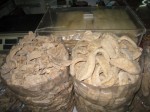 When purchasing dried fruit, 9 out of 10 people will pick the bag that looks prettier than the one that has fruit turned brown. Go beyond the beautiful color because that beautiful color is deceiving, it may even carry toxins. Sulfur dioxide is used to prevent discoloration in dried fruit and has significant side effects on some people. The most common reactions are diarrhea, allergies, headaches and asthma.
When purchasing dried fruit, 9 out of 10 people will pick the bag that looks prettier than the one that has fruit turned brown. Go beyond the beautiful color because that beautiful color is deceiving, it may even carry toxins. Sulfur dioxide is used to prevent discoloration in dried fruit and has significant side effects on some people. The most common reactions are diarrhea, allergies, headaches and asthma.
Now what about the herbs you buy?
Do your herbs contain sulfur dioxide (SD) and does SD effect the fundamental quality of the herbs?
Chinese herbs are derived from natural plant and mineral products. Like any natural product, they are vulnerable to mold and insect infestation. To control the decay and mold many herbal products and natural supplements are sprayed with sulfur based fumigation. This process kills bacteria, mold, insects and may also be used for bleaching/ cleaning raw herbs.
But can it change the chemical constituents of a particular herb? In some cases we know for a fact the answer is YES! Pac Herbs products are not fumigated with SD! We believe the byproduct of fumigation is unacceptable as it often changes the nature of the herb.
Sulfer dioxide is commonly used by some farmers to cosmetically improve the appearance of the herb Dioscorea, (Shan Yao) Pueraria Root ( Ge Gen) and dried ginger (Gan Jiang). In high sugar content raw herbs SD causes the herbs to taste more acidic, in herbs containing fatty oils such as persica (tao ren) used in our PMS Relief, fumigation leaves a pungent oil odor. Fragile herbs such as Chrysanthemum (Ju Hua) should never be fumigated with sulfur dioxide because it damages Chrysanthemum's fundamental qualities.
As a preservative, sulfur dioxide is often used in dried fruit because it's antimicrobial properties preserve freshness, reduce rotting and help maintain the appearance of the fruit. Sulfur dioxide is an important compound in wine making. It serves as an antibiotic and antioxidant, protecting wine from spoilage by bacteria and oxidation. The Center for Science in the Public Interest lists two food preservatives, sulfur dioxide and sodium bisulfate as being safe for human consumption except for certain individuals who may be sensitive to it, even in small amounts.
- Our labs conduct sulfur dioxide residue tests before our herbs are processed to insure the our natural herbal products are sulfur free. When I visited wholesale herb markets in China, the un-sulfured herbs were noticeable different in color and price (see above picture) from the same herbs treated with sulfur. Untreated herbs were always more expensive, what does that tell you?
Center for Science in the Public Interest.. http://www.cspinet.org/reports/chemcuisine.htm#sulfites

